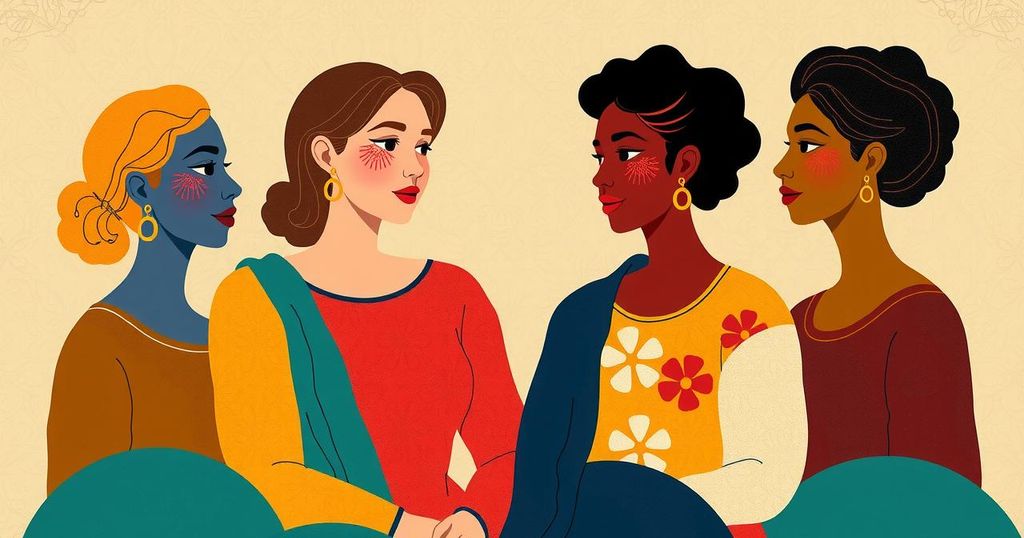Politics
ASIA VILLEGAS, CUBA, DEMOCRACY, HUMAN RIGHTS, HUMAN_RIGHTS, MIDTOWN MANHATTAN, NATIONAL SECURITY, NEW YORK, NORTH AMERICA, NYC, SOUTH AMERICA, TRUMP, UNITED NATIONS, UNITED STATES, VENEZUELA, VENEZUELAN NATIONAL ASSEMBLY, VILLEGAS, WASHINGTON, WORKERS WORLD PARTY, WWP
Leila Ramsay
0 Comments
Venezuelan and Nicaraguan Women Leaders Address Imperialism in NYC Meeting
Women leaders from Venezuela and Nicaragua participated in a discussion in NYC, addressing U.S. imperialism’s impact and women’s gains in their societies. Asia Villegas and Hazel Reyes shared insights on sanctions and gender equality achievements, highlighting solidarity with oppressed groups worldwide. The meeting included grassroots advocates and was recorded for further dissemination.
On March 20, women leaders from Venezuela and Nicaragua participated in an open discussion hosted by U.S. anti-imperialist activists at the Workers World Party office in New York City. The meeting coincided with their attendance at United Nations women’s organizations. The primary focus was the resistance of Venezuela and Nicaragua to U.S. imperialist policies as well as the achievements of women in these Latin American countries.
The meeting was particularly pertinent in light of recent deportations of Venezuelan migrants by the Trump administration, highlighting Venezuela’s support for returning migrants and defending their rights. These nations seldom engage with U.S. audiences due to government repression, making the event significant. A recording of the meeting was promptly uploaded to the Workers World Party’s YouTube channel.
Asia Villegas, Deputy to the Venezuelan National Assembly, initiated the discourse by stating that “Trump’s second mandate is characterized by external aggression.” She discussed the U.S. sanctions, known as unilateral coercive measures, imposed on Venezuela, which have accumulated losses of approximately $650 billion since the 2000s, affecting 30 countries and 28% of the global population, with women and children suffering the most.
Villegas condemned the recent actions of the Trump administration that labeled Venezuelan migrants as gang members without due process, resulting in their deportation to El Salvador. She emphasized that economic warfare initiated the migration crisis and criticized the withdrawal of Temporary Protective Status by the Trump regime as a betrayal.
Highlighting Venezuela’s diverse cultural heritage, Villegas stated, “We are not criminals, and we are not enemies of the people of the United States.” She attributed Venezuela’s resilience against U.S. aggression to strong communal organizations and expressed solidarity with women and oppressed groups globally, notably Palestinians facing violence from Israel and the Cuban population enduring a blockade.
Hazel Reyes, Nicaragua’s Minister Counsellor and representative for the women’s commission, informed attendees that Nicaragua ranks first for gender equality in Latin America and sixth globally, according to the World Economic Forum’s 2024 report. She attributed the lack of awareness regarding these achievements to a longstanding anti-Sandinista U.S. campaign.
Reyes highlighted educational advancements, noting that women constitute 52% of students in higher education, alongside a 50-50 representation policy in governance. During the Q&A, she also addressed the progress of Indigenous communities in Nicaragua and development projects enhancing life in rural areas, such as improved access to electricity and highways.
The meeting was co-chaired by Saher Al-Khabash and Mairead Skehan Gillis, who also provided translation services. Prior to the guest speakers, representatives from the Bronx Anti-War Coalition and Mutual Aid and Scientific Socialism discussed their initiatives, underscoring grassroots activism.
The meeting emphasized the resilience of Venezuelan and Nicaraguan women against U.S. imperialism, showcasing their achievements in gender equality and education. As sanctions and deportations affect vulnerable populations, voices from these nations call for solidarity and recognition of their rights. By highlighting their struggles and successes, the women’s leaders reinforced the importance of unity against oppressive regimes and the need for continued advocacy for equality and justice.
Original Source: www.workers.org




Post Comment